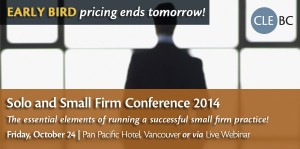♫ I only need to tell myself
See what the future holds… ♫
Lyrics, music and recorded by S.P.Y.
Just a note that the 2014 Solo and Small Firm Conference early bird rate ends tomorrow…!!
This is a CLE-BC conference and we have worked quite hard on the content and the speakers. This is for anyone running or in a solo or small firm practice or thinking of launching one.
This is the latest in a series of Solo and Small Firm Conferences that have been hosted by CLE-BC. It only comes around every 2 years.
We have outstanding speakers including the Past President of the CBA Fred Headon doing the lunch keynote on the implications of the CBA Futures Report for solo and small firms (by Skype!).
You can attend in person or virtually.
Topics include Business School for Lawyers – what they didn’t teach you in Law School; Managing the Finances – Making the Numbers Work, Law Office Management and Technology, Marketing Ethically, Dealing with the Self Represented and Freeman on the Land, Solo and Small Firm issues and a guest presentation by the founders of the Axess Law Firm in Ontario – who have ’embedded’ a law practice inside a number of Wal*Mart stores in Ontario.
This is a fresh look at solo and small firm practice…and an exciting one.
As the conference chair, I welcome you to the conference and I am looking forward to seeing you all there. Come and see what the future holds!
♫ I want to be part of the solution
Can you use me to lead a revolution?
I want to be part of the solution… ♫
Music, Lyrics and recorded by: Jonah33.
The issues facing the profession have been set out by many: from Richard Susskind as documented in his many books, to Madam Justice McLachlin, who has said:
“Timely, effective access is the most pressing issue facing Canada’s justice system, says Supreme Court Chief Justice Beverley McLachlin.
Many people have given up on seeking justice through the courts, deterred by the often expensive and time consuming process, she said.
…
“We do need some new approaches…we need to get behind the solutions,” she said.
The problems facing the justice system and the legal profession are well set out. The issue is where are the solutions to come from? More importantly, where will the leadership come from?
The Canadian Bar Association has now published its comprehensive August 2014 report, Futures: Transforming the Delivery of Legal Services in Canada. This report is the culmination of two years of consultation, original research and analysis on the future legal marketplace in Canada, and includes a series of recommendations on where and how the profession can transform itself. (See more at: http://www.cbafutures.org/reports#sthash.NMcwadWx.dpuf)
The hardest issue, as I see it, will be in implementing the recommendations that have been brought forward. Implementation of change is always the hardest part of any process. Here the law schools are facing a critical juncture: do they help lead the change to meet the new challenges – or – do they stand in the way of change?
In an article in The New Republic entitled “How to Fix Law School” (http://www.newrepublic.com/article/113983/how-fix-law-school-symposium) Mike Kinsley says:
“When you graduate, you should be prepared to pass the bar. The discovery that everything you have crammed into your head for three years has no relevance at all, and you have to master a whole new curriculum in just a few weeks for the bar exam, is dispiriting.
It’s absurd that you can graduate from law school without ever seeing a real client. Some clinical courses ought to be mandatory. Trainee doctors start seeing real patients within a year and a half. Trainee lawyers can go three, and graduate, without ever touching a client. And, let’s be honest, the training of your doctor is more important.”
I think law schools need to lead the change that we wish to see in the profession. It all starts here, from the training of lawyers to practice law (including training on issues such as practice management, actually running a business and using legal technology) to how to manage clients and actually do a conveyance, an incorporation or a decently drafted will. We need law schools to think differently.
Most of all, we need law schools to teach law students to be leaders who can step up and continue this process of change in order that the legal profession remains a strong, independent profession and continues to serve the needs of the community.
We need leadership in the profession and this training must start in law school. Law schools need to fully embrace being part of the solution in leading the revolution. In my view we don’t need any more law schools in this country that train lawyers in the old ways of doing things. What we need are the existing law schools to produce graduates that are going to be leaders in moving the profession forward with new approaches, new technologies and new ways of thinking – we need law schools to be part of the solution.
(Article has been updated. The original was published in CBA’s publication BarTalk).
♫ Well, rave on it’s a crazy feeling
And I know it’s got me reeling
I’m so glad that you’re revealing your love for me…♫
Lyrics and music by: Shaun Ryder, Paul Richard Davis, Mark Philip Day, Paul Anthony Ryder, Gary Kenneth Whelan, recorded by Buddy Holly.
In the prior two posts on lawyers and pricing, we have been discussing the issue that price is but one part of the 7 components of the legal marketing mix. Part 2 discussed the product mix and how you can change your legal product mix to better meet the needs of your clients in a way that distinguishes your services from those of the competition. In this post we are exploring how important the people who deliver your legal services are and how this can be a distinct competitive advantage.
All of us have experienced situations where your first contact with a business is with someone who just makes you feel like looking after you is the most important thing for them to do in their day. I had that experience today – I called a law firm and spoke to an assistant who, when I asked to speak to her principal, said in the most caring voice: “Well, he isn’t in his office right now but let me go out and round him up for you.” This was my very first contact with this firm and this wonderful lady didn’t know me from Adam. The way she made me feel was simply amazing. She made me feel valued and important. I recognized her exceptional people skills and thought about how she was a tremendous asset to the firm.
In Good to Great, Jim Collins said that the most important factor applied by the best companies is that they first of all “Got the right people on the bus, and the wrong people off the bus.” In other words, your ability to select, recruit, train and retain the best people with the skills and abilities to do the job right is more important than everything else put together.
The Spectacled Marketer says:
If a customer feels their expectations of your business are exceeded, then the chances of a referral are exponentially increased because their loyalty to your company is exponentially increased as well!
You need to strive for your clients to feel exceptionally satisfied so that they rave about your services. How do you exceed your client’s expectations? The first step is …hold on now…ask them! Yet lawyers and law firms *shudder* at the thought of asking clients three simple questions:
- What did they like about the firm’s services,
- What didn’t they like, and
- How could the firm firm do it better.
If you find out that there is someone on your bus that shouldn’t be there…you have a decision to make. If you find out that you have someone on your bus who is simply exceptional and is a tremendous asset to your firm, make sure you recognize and reward them accordingly!
In considering the marketing of your practice, consider how the people in your business can either make your clients rage on, feel indifferent, feel satisfied or preferably, rave on about your services. Your client service can be a strong distinguishing factor as compared to your competition. In terms of your marketing mix, strive for having very satisfied clients showing their “love by raving on about you!”
(cross posted to www.tips.slaw.ca)
♫ Keep moving, never stopping sharks
Keep moving…♫
Music, lyrics and recorded by Further Seems Forever.
In the first column in this series we dealt with the issue that price is but one part of the 7 components of the legal marketing mix. Unfortunately many lawyers (and clients) tend to overly focus on price and not appreciate the other 6. The theme of this post will be to look at the product mix and the role that it plays in marketing (and pricing!) of legal services.
One law firm is different from another in terms of the mix of services that they can provide. My colleague and friend Bob Denney produces a “What’s Hot and What’s Not” report several times a year that I repost on here on my blog Thoughtfullaw.com with his kind permission. This report shows what services are in demand, what are staying neutral and which are declining. The importance here is that if you can be nimble, you can change your mix of legal services. Staying with the same mix of services can result in stagnation. In fact, Woody Allen in one of his movies once said:
“A relationship, I think, is like a shark, you know? It has to move constantly move forward or it dies. And I think what we got on our hands is a dead shark”
The one thing that you don’t want to be as a law firm is a dead shark.
So survey your clients – do external reviews of what services are in demand, look at what industries are on the upswing in your area and think about how you can provide needed legal services to them. Compare your marketing mix of services to your competitors and see how you stack up. Eventually what you are doing will grow old in the eyes of the consumer – you need to change things up – complacency is the enemy of success.
If you can offer a unique mix of services that are more closely aligned to the needs of your clients, then you have moved from competing solely on price to being able to distinguish your services from those offered by the competition and show to the clients that you are doing a better job in terms of meeting their needs than the competition. The clients could say “Yes we could move to Dewey Gottem & Howe, but they don’t do what Werk, Worke and Wourke do for us…” You have moved from competing on price to competing based on the perceived value of your services from the viewpoint of the client. You have become a moving, never stopping shark…






















